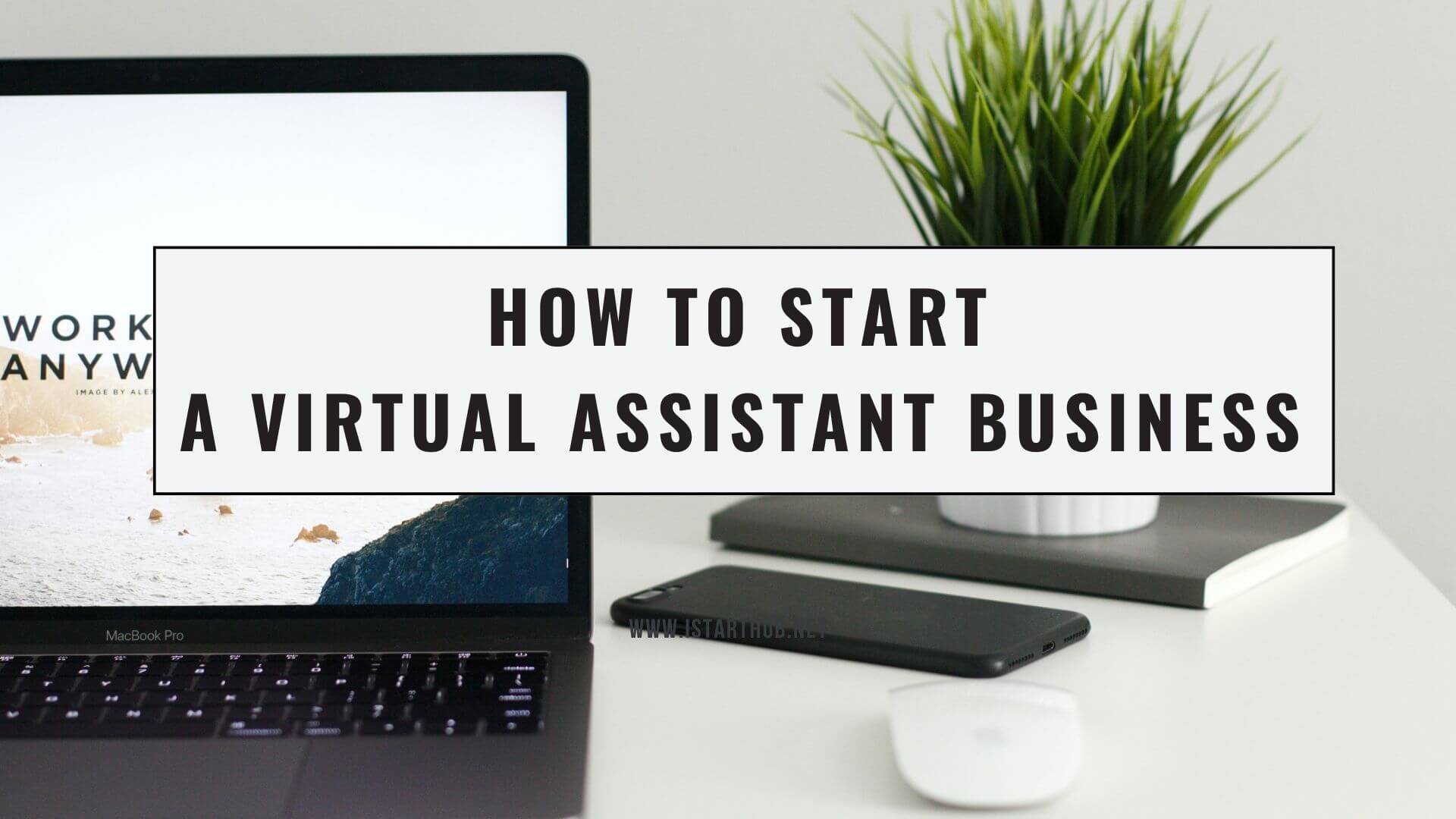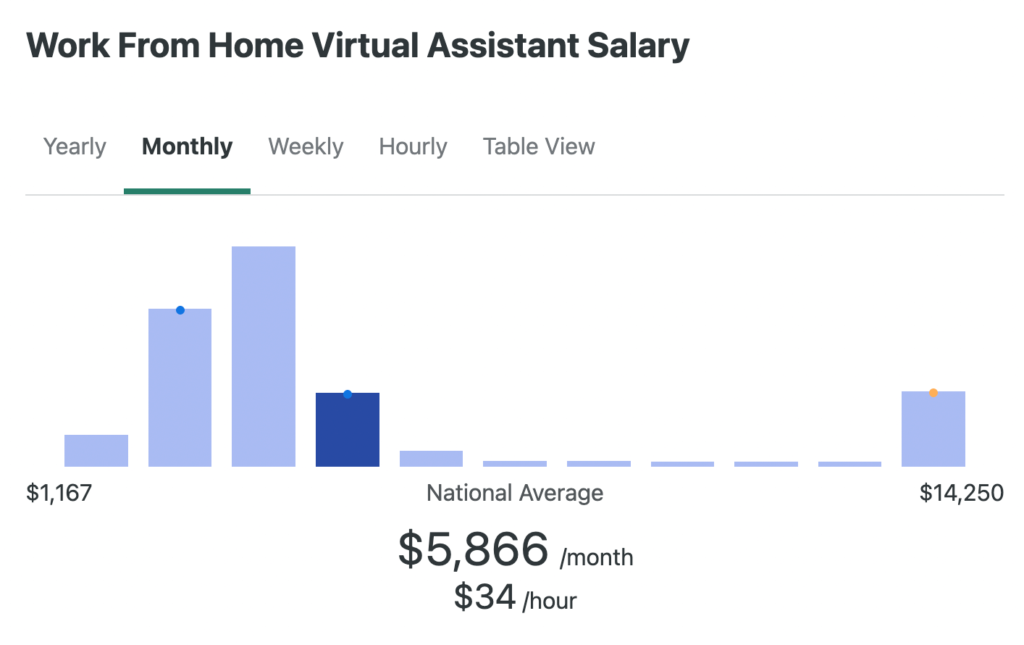Now Reading: 7 Simple Steps On How to Start a Virtual Assistant Business
- 01
7 Simple Steps On How to Start a Virtual Assistant Business
7 Simple Steps On How to Start a Virtual Assistant Business

Time is priceless, and business owners understand the meaning of this phrase better than anybody else does.
The recent entrepreneurial boom resulted in the fast development of virtual assistant businesses to help business founders multitask and allow them to focus more on strategic growth.
Starting a virtual assistant business is fast, and easy, requires no investment, and brings lots of benefits.
Affiliate Disclosure: some of the links in this article are affiliate links. It means that if you buy through these links, we may earn a small commission to support this website at no cost to you.
Why start a virtual assistant business?
Several months ago, I started to join closed groups on Facebook dedicated to business growth strategies and entrepreneurship. Actually, I did that on purpose.
My goal of being a part of Facebook communities was not to promote my business or ask for advice. Though it can also help, I had a different goal.
I wanted to analyze what starting entrepreneurs are interested in, what business niches are most popular among the starters, and the difficulties most business owners should face daily.
And you know what?
The virtual assistant business appeared to be one of the most popular among the starters.
It is not surprising because it is easy to start and requires no investment.
But what is more interesting here…
Frequent requests from Facebook group members have shown that virtual assistants are in high demand now among business owners.

Why?
It is simple. When you are growing a business, some tasks take too much time. Therefore, it is easier and CHEAPER to hire a virtual assistant and focus on business development, rather than spend hours doing routine work. And that is the reason why the virtual assistant business has started to grow considerably over the last several years. Here are some other reasons why start a virtual assistant business:
Read also: How to start a dropshipping business
Low investment
Starting a virtual assistant business requires minimal investment. It is totally online and can be easily scalable.
High Demand
Entrepreneurs always need help with tasks like email management, scheduling, and administrative work, creating a consistent demand for virtual assistants. Even at a time when AI business is growing, virtual assistance helps to manage AI tasks and do research.
Flexibility
The virtual assistant business offers flexibility regarding work hours and location, allowing entrepreneurs to balance work and personal life.
Technology
Advancements in technology help to collaborate remotely and provide efficient virtual assistant services. You can manage your virtual assistants using task tracker systems like Trello, Asana, Jira, or others.
Income Potential
With the right skills and a solid client base, you can earn a substantial income as a virtual assistant. What I like about the virtual assistant business is that the bigger the team the more tasks you can handle and the more income you get! No limits at all.

Just take a look at the data below, an average virtual assistant salary is $34 an hour. When you build a reputable virtual assistant company, you can charge up to $82 and more.
How to start a virtual assistant business
To start a virtual assistant business, follow the simple steps described below.
1. Define your virtual assistant business idea
Everything starts with an idea. If you want to build a successful business define a virtual assistant business idea.
Will you focus on social media management or email marketing?
Will your virtual assistance business provide executive assistance?
Go through the virtual assistant business ideas and tasks and define the one you will focus on.
Virtual Assistant Business Ideas
The virtual assistant (VA) industry offers a wide range of services you can specialize in, depending on your skills and interests. Here are some popular and profitable virtual assistant business ideas to consider:
| VA Business Idea | Description | VA services | Target Clients |
|---|---|---|---|
| 1. Administrative support | Provide general administrative tasks to help businesses and entrepreneurs manage their daily operations. | – Email management – Calendar scheduling – Data entry – Document preparation – Travel arrangements | Small business owners, executives, and consultants |
| 2. Social Media Management | Manage and grow social media accounts for businesses to manage online presence and engagement | – Content creation and scheduling – Audience engagement – Analytics and reports – Advertising campaigns – Influencer collaborations | Brands, startups, influencers, and non-profits |
| 3. Customer Support | Provide customer service and support for businesses, helping them maintain positive customer relationships | – Responding to customer inquiries – Handling complaints and returns – Live chat support – Technical support – Customer feedback collection | E-commerce businesses, tech companies, service providers |
| 4. Content Creation | Create high-quality content for blogs, websites, and marketing materials | – Blog writing – Copywriting – Editing and proofreading – Graphic design – Video editing | Bloggers, marketing agencies, businesses with a strong online presence |
| 5. Bookkeeping and Accounting | Manage financial records and transactions for businesses | – Invoicing and billing – Expense tracking – Financial reporting – Payroll processing – Tax preparation assistance | Small businesses, freelancers, startups |
| 6. Email Marketing | Develop and execute email marketing campaigns to engage and convert subscribers | – Email campaign setup and management – Newsletter creation – Subscriber list management – Performance tracking and reporting – A/B testing | E-commerce businesses, online coaches, digital marketers |
| 7. Project Management | Coordinate projects to ensure they are completed on time and within budget | – Project planning and scheduling – Resource allocation – Task management – Progress tracking and reporting – Risk management | Construction companies, marketing agencies, startups, IT firms. |
| 8. SEO Services | Optimize websites to improve search engine rankings and drive organic traffic | – Keyword research – On-page and off-page SEO – Content optimization – Link building – SEO audits | Bloggers, e-commerce sites, local businesses |
| 9. E-commerce Support | Assist e-commerce businesses with various tasks to boost sales. | – Product listing and optimization – Order processing Inventory management – Customer service – Social media marketing | Online retailers, dropshippers, and Amazon sellers. |
| 10. Technical Support | Provide technical assistance and troubleshooting for software and hardware issues. | – Remote IT support – Software installation and updates – Network setup and maintenance – Cybersecurity monitoring – Technical training | Tech startups, small businesses, remote teams |
Read also: How to generate great small business ideas
2. Define your Virtual Assistant business pricing strategy
Determine your pricing structure and service packages. How to do that? Research competitors to ensure your rates are competitive and reflect your expertise.
Here are the most popular strategies to price your virtual assistant business services:
Hourly vs. Flat Rate
Decide whether you’ll charge clients hourly or offer flat-rate packages. Flat rates can be attractive to clients as they know exactly what they’ll pay upfront.
Value-Based Pricing
Consider the value you provide. If you can save entrepreneurs time and help them grow their businesses, you can justify higher rates.
Tiered Pricing
Create different service packages or tiers to cater to various client needs. Offer Basic, Standard, and Premium packages with increasing levels of service and pricing.
3. Register your virtual assistant business

Register your business to establish your professional identity and ensuring legal compliance.
Despite legal protection, it will add professionalism to your virtual assistant business. Your potential clients will see you are committed and serious about your work.
Also, creating an LLC for a virtual assistant business help build trust and credibility, especially when dealing with entrepreneurs.
This is how to open an LLC for a virtual assistant
- Create a free account with ZenBusiness.
- Fill in all the required data
- Don’t hesitate to contact their support in case you have questions
- Congratulations on registering your business!
ZenBusiness is a reputable LLC service provider. They are the best fit for entrepreneurs and simplify the process by saving you time and doing all the paperwork.
4. Create a VA business portfolio
Building a portfolio for your virtual assistant business is one of the best tools to attract potential clients. But how can you do that?
Here are a few ways to create a virtual business portfolio:
Show work samples
Gather examples of your work. This could be documents, reports, social media posts, or any task you’ve completed for previous clients. the main goal here is to demonstrate your expertise.
Case Studies
Create case studies for some of your projects.
- Describe your client’s problem
- Outline the tasks you did
- Show the results achieved.
Use real data and metrics whenever possible to quantify your impact.
Client Testimonials
Include testimonials from satisfied clients. These can be short quotes or longer endorsements. Ensure they emphasize the value you provided.
Professional Presentation
Design a clean and professional portfolio website or document. Make it professional by using a consistent color scheme and typography.
Use images, charts, and graphs to make your portfolio visually appealing and illustrate your work.
5. Manage VA clients
Client management is vital for growing a powerful virtual assistant brand.
If you don’t know what a CRM is, it is a client management software that allows you easily track your clients tasks and processes. This is the first important step in optimization process. And you can do this using a CRM from HubSpot.

HubSpot – sales and client management
HubSpot provides small business tools to increase sales and manage clients in one place.
- Clients management
- Email marketing
- Sales automation
- Content marketing
- Need some time for beginners to learn the information
HubSpot Features:
- Contact Management. Store and organize client information, including contact details, communication history, and notes. This helps you keep track of all client interactions in one place.
- Communication Tracking. Keep track of emails, calls, and meetings with clients. HubSpot allows you to log and monitor all communication, ensuring you never miss a detail.
- Task Management. Assign and monitor tasks to ensure timely completion of projects. HubSpot’s task management features help you stay organized and meet deadlines.
- Sales Pipeline. Manage your sales process, from initial contact to closing deals. This helps you track the progress of potential clients and prioritize follow-ups.
6. Grow a virtual assistant business
Starting a virtual assistant business you need to think about the best ways of getting clients.
How to promote a virtual assistant business?
Here is the list of key steps you should follow to grow your virtual assistant business:
1. Create a website
Create an attractive website with the services provided by your virtual assistant business. Fortunately, there are lots of ways to create a website without special coding skills.
Get Hostgator hosting and build a WordPress website with one click.
2. Grow website traffic and boost sales
Effective marketing is key to attracting and retaining clients. Start with Semrush, an all-in-one marketing tool that can simplify this process and maximize your marketing efforts.

All-in-one marketing platform for small business
- Attract new clients
- Research topic ideas related to your niche
- Build creative content
- Analyze competitors and trends
- Register your business on catalogs and gain exposure
Semrush is a time saver when it goes about growing a virtual assistant business. Despite your business sales growth, you can also use Semrush for clients’ tasks and make money with it!
There is no reason not to try this tool!
3. Network with potential clients
Networking is all about WIN-WIN relationships.
The more people you can help the more clients you will get. Communicate more and do not focus just on direct business promotion. Focus on providing help to others.
You’ll be surprised how word-of-mouth can impact your business growth.
4. Join Facebook groups
Join Facebook groups for entrepreneurs and small business owners and try to offer your services there.
Here is the list of some great Facebook groups you can consider:
5. Use X and Facebook ads
Social media ads can help a lot in targeting your market. For example, if you target doctors or business coaches, just select these areas of interest before posting your ad and your future clients will see your promo.
Read also: How Changes in Facebook News Feed Algorithm Will Impact Business
6. Blogging
Create a blog and write articles about different problems solved by virtual assistants to attract more clients. A website with regularly updated content is easier to promote. Besides, you can attract more people via organic search.
7. Participate in conferences/meetings
If you promote your VA business online, it is awesome. But do not forget about the real meetings. The local market can give you unlimited opportunities for growth since
8. Comment on forums and Q&A websites
Find some niche forums and websites where entrepreneurs are searching for help. Be active in commenting and answering the questions. In this case, you’ll get noticeable quickly and have more chances to get new clients.
9. Introduce on LinkedIn
LinkedIn is a powerful tool for networking and marketing business. Make sure your profile looks professional and represents your skills.

One of the best ways to promote your virtual assistant business is to join the communities and introduce your services there. As an alternative, you can create your community and share company news on a regular basis.
Surely, you can personally contact business owners offering your help, but the most effective way is to ask for an introduction from your professional network.
7. Manage finances
The last but not the least is about efficient financial management. As a virtual assistant business owner, you need to handle invoicing, expense tracking, and financial reporting.
One of the tools you can try is FreshBooks accounting software.

Freshbooks Accounting Software
- 60% off for 4 months
- Send invoices
- Track expenses
- Get paid for your VA services
- Get reports
- Automate the processes
Top Freshbooks features
- Invoicing. Create and send professional invoices. You can customize invoices and automate reminders for overdue invoices.
- Expense tracking. Automatically track and categorize expenses by connecting your bank accounts and credit cards. This helps you monitor your spending and manage your budget.
- Financial reports. Generate detailed financial reports, such as profit and loss statements, balance sheets, and tax summaries to monitor your business performance.
Virtual Assistant vs. Online Business Manager: What is the difference?
If you are interested in helping your clients with more strategic tasks, you should think about providing business management services.
Online Business Manager’s (OBM) tasks can be the following:
- Team management
- Strategy planning
- Task management
- Project management
- Reaching business goals
OBM focuses on business planning and business growth, while virtual assistants perform more specific administrative, marketing, and technical tasks.
Both types of services are in high demand now, and it is up to you what services to offer.
Be as specific as you can listing the services your business provides. Focus on 3-5 tasks you would like to help with.
In this case, you can identify your Target Audience to promote virtual assistant business.
FAQs about virtual assistant business
1. Is a Virtual Assistant Business Profitable?
Starting a virtual assistant business can be highly profitable if managed effectively. Here is why:
- Low Overhead Costs
Operating from home or a co-working space eliminates the need for office rent. To start a VA business you just need a computer, internet connection, and software tools.
- High demand for VA services
Businesses increasingly rely on VAs to handle administrative, technical, and creative tasks.
- Scalability
You can expand services by adding more services as you gain experience and clients. By delegating tasks to other VAs you can handle more clients. Use software to automate repetitive tasks, increasing efficiency.
- Multiple Revenue Streams
Here are some ideas how you can scale your virtual assistant business:
- Offer bundled services at a discounted rate to encourage long-term contracts.
- Create and sell courses or e-books to teach others how to become VAs.
- Promote tools and services you use, earning commissions on sales.
Final thoughts
I am sure that the virtual assistant business will continue to grow. If you want to contribute to clients’ business growth and build a profitable company, starting a virtual assistant business is perfect for you.
Just focus on particular services without trying to cover everything. Do not forget about competitors and provide only high-quality service.
Good luck!
Tetiana is a business coach and owner of IStartHub, a business media for ambitious female entrepreneurs and small business owners.
















